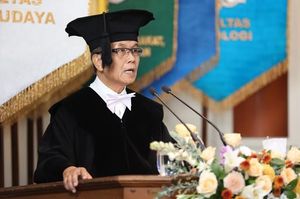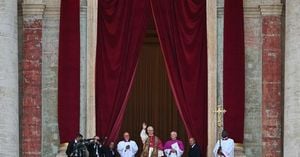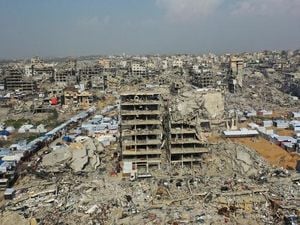The passing of Nguyen Phu Trong, Vietnam's long-serving general secretary, has plunged the country into a vortex of political uncertainty, raising pressing questions about the future leadership of a nation grappling with both economic aspirations and a robust political legacy. Trong's death after a period of illness marks a critical juncture in Vietnam's politics, as it is the first time in over three decades that a top-ranking official has died while still in office. This sudden vacancy at the pinnacle of power is expected to trigger a fierce struggle over the direction of the ruling Communist Party amid the backdrop of ongoing economic challenges and geopolitical tensions.
Nguyen Phu Trong's tenure as general secretary began in 2011, a period during which he became synonymous with the strict anti-corruption campaign known as the "blazing furnaces." This initiative sought to root out corruption embedded within the ranks of the party, leading to the indictment of numerous officials and reshaping the political landscape. Despite these efforts, observers have noted that the campaign has not effectively curtailed corruption, as Vietnam still ranks poorly in global corruption indices.
As Vietnam adjusts to its new political reality, President To Lam has stepped into the fray, temporarily carrying forward the responsibilities of general secretary while continuing his presidency. This transition is illustrative of the party's internal dynamics, as Lam is one of the few candidates eligible for the role, having previously served in key security positions. Lam's relationship with the party's power structure, specifically his enforcement of Trong's anti-corruption initiatives, positions him as a frontrunner for a permanent appointment as general secretary. However, the political landscape in Vietnam remains opaque, with various factions within the party likely to vie for influence in the succession process.
In the immediate aftermath of Trong’s death, national mourning has been declared, with a state funeral planned to honor his contributions to both the party and the nation. Party officials, including Lam, have expressed profound respect for Trong's legacy, citing his significant role in elevating Vietnam’s economic landscape. Under his leadership, the nation’s GDP per capita more than doubled, and numerous free trade agreements were established that further integrated Vietnam into the global economy.
Vietnamese analysts have highlighted that, while Lam is expected to maintain continuity in foreign policy—aiming to balance relations with major powers like the United States, China, and Russia—the country might see a shift in economic priorities. Experts view Lam as more market-oriented compared to Trong, suggesting that he might champion policies aimed at invigorating Vietnam's economy amidst challenges such as inflation and global trade disruptions.
The upcoming 14th National Congress, slated for January 2026, looms large on the horizon, where Vietnam's political elites will convene to deliberate on the future direction of the party. Observers argue that this Congress could signal a potential turning point in Vietnam’s political structure, reminiscent of the pivotal shifts seen after the 1986 Congress, which initiated the Doi Moi reforms—an era of economic renovation. Nevertheless, analysts caution against expecting drastic reform in leadership or policy, suggesting instead a focus on stability as the party navigates the challenge of transitioning authority to a younger cadre.
Leading theorists and experts express concern that Vietnam's political landscape may face an intensified rivalry among factions vying for power, particularly given the backdrop of Trong's influential rule that prioritized party integrity above all. The uncertainty surrounding the successor has raised the stakes of this internal competition, especially as the members of the Politburo evaluate potential successors capable of steering the party through turbulent waters while preserving its ideological foundations.
Meanwhile, Lam's recent ascent to the presidency follows his predecessor, Vo Van Thuong’s abrupt resignation after just a year in office, a move seen as part of the wider anti-corruption initiatives that have shaken the upper echelons of the party. Thuong was reportedly forced out after violations of party rules were uncovered, reflecting the precariousness of leadership roles tied directly to the anti-corruption narrative.
As Vietnam stands at this crossroads, the necessity for robust governance has never been greater. Many within the country express a mix of anxiety and anticipation, unsure of what the future may hold under new leadership. The reaffirmation of power dynamics within the party, most notably seen through Lam's actions, could establish a pathway for either unification or further splintering within party ranks.
This political vacuum heralds the beginning of a new chapter in Vietnam’s journey with the stakes not merely confined to party loyalty, but extending into the very fabric of Vietnamese society. With growing domestic and international expectations, the next few years will reveal whether the ruling party can successfully navigate the delicate balance between tradition and change, order and vibrancy in policy-making. The nation watches closely, aspiring for leadership that would ensure prosperity while staying true to the socialist values that underpin the Communist Party's long-standing hegemony.
“We share the feeling of anxiety of the unknown,” remarked Giang Nguyen, a senior fellow at the ISEAS-Yusof Ishak Institute. “It is the end of an era.” As the party embarks on this new journey, the world will be observing the developments in Vietnam with keen interest, hoping that the leadership transition can foster a government that not only navigates its internal challenges but also strengthens its stature on the international stage.



